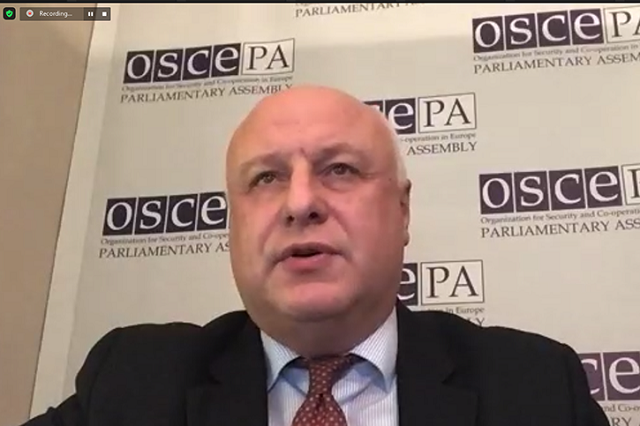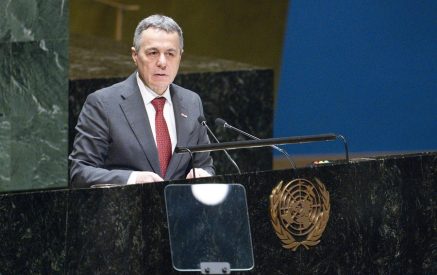COPENHAGEN, 26 November 2020 – One week before the Ministerial Council, the OSCE’s central decision-making body, OSCE Parliamentary Assembly President George Tsereteli addressed ambassadors at today’s Permanent Council meeting in Vienna. Noting that it has now been 30 years since governments came together to adopt the Charter of Paris for a New Europe and promote relations founded on respect and co-operation, he stressed that the OSCE must reach its potential to help build a safer and more stable future.
“While an increasing number of transnational and global threats are confronting the OSCE community and threatening our common security, we must empower the organization with the resources and political support it urgently needs to address old and new challenges,” Tsereteli said.
He regretted that the OSCE area remains plagued by confrontation and division and that the limited political-level engagement in the organization has led to a leadership vacuum in the executive structures.
“As we scan all around the OSCE region, despite the good work that the organization has done on the ground, in particular in the field presences, but also in the politico-military dimension, it seems that several participating States have largely failed to live up to this pledge,” he said.
Read also
The outbreak of war over Nagorno-Karabakh has been a painful reminder of the urgency in resolving protracted conflicts, he said, noting that it is now crucial that the sides commit to allowing the safe return of internally displaced persons and refugees and reaching a long-term and comprehensive settlement. “As the ceasefire continues to hold, I truly hope it will offer an opportunity for serious negotiations that might finally lead to a long-lasting peace,” he said.
He noted that it is important to also keep attention focused on other conflicts in the OSCE region. “In Ukraine and in Georgia,” he said, “we need to see a continuation of serious negotiations, including of discussions at the highest level to facilitate peaceful breakthroughs that can alleviate the suffering of civilians trapped in the conflict zones.”
Tsereteli called the situation in Georgia “unacceptable,” noting that failure to implement the August 2008 Ceasefire Agreement, continued military occupation, intensified borderization, and the division of local communities continues to endanger the health and lives of populations affected by the conflict.
He also reiterated calls to fully restore Ukraine’s sovereignty and territorial integrity within its internationally recognized borders.
The President discussed post-election events in Belarus, noting that the PA has expressed concern over the excessive use of force. “I am deeply troubled at the intensifying violence, with reports of several deaths, despite the overwhelmingly peaceful nature of the demonstrations in the past 100 days,” Tsereteli said.
Tsereteli informed the ambassadors of the outcomes of the PA’s series of Parliamentary Web Dialogues this year, as well as its efforts to resume election observation activities after a hiatus in the spring and summer due to the pandemic. With observers deployed to Montenegro at the end of August, and more recently to Georgia and the United States, he noted that the PA also plans to observe upcoming elections in Kyrgyzstan and Kazakhstan.
“The readiness of our parliamentarians to actively take part in these missions is yet another reminder of the OSCE Parliamentary Assembly’s dedication to help governments live up to their human rights commitments,” he said.
Looking ahead to the Ministerial Council next week, Tsereteli pointed out that given the multiplicity of challenges the OSCE has been entrusted with, it is urgent that foreign ministers come together and provide decisive leadership to fully enable the organization to accomplish its mission.
In the question and answer session of the President’s remarks, ambassadors expressed appreciation for the Assembly’s work in a number of areas, including the attention it pays to people in conflict zones, gender issues, and its efforts to build dialogue within Belarus between the government and the opposition. The PA’s role as a platform for mutual respectful and constructive dialogue on pressing issues facing the OSCE was noted, as well as its role in promoting adherence to international commitments.
For President Tsereteli’s full remarks to the Permanent Council, please click here.
OSCE Parliamentary Assembly






















































